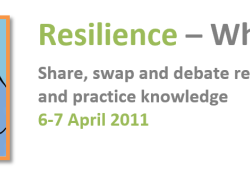Topic: The role of physical activity in supporting resilience to, and recovery in and from, mental health difficulties, with specific reference to a local mind association boxercise class – Simeon Elliott
Resources: You can download Simeon’s slides.
Session summary: This session will consider the qualitative and quantitative research evidence for the role of physical activity in developing resilience to, and recovery in and from, mental health difficulties. The session will discuss the biophysical and psychosocial aspects of physical activity that promote psychological well-being, and it will consider the support that may be required by those with severe and enduring mental health difficulties to access physical activity programmes. The session will examine a particular case study – a boxercise class facilitated by a local Mind association – in order to consider how the participants of this class themselves explained how boxercise helped them to develop resilience and better psychological health.
Biography: Simeon has just completed an MSC in Applied Positive Psychology; his research focus was on physical activity and mental health. Simeon is also a specialist teacher (PGCE) working with children with speech, language and communication disorders in East Sussex. As a freelance consultant, Simeon provides advice, support and training on child and adult wellbeing and communication, and he is licensed by ICAN, the children’s speech, language and communication charity, Makaton, and the Young Foundation, to deliver training packages on language, communication, wellbeing, resilience and augmentative and alternative communication. Simeon is a volunteer manager with the charity Brighton and Hove Parkrun, and he is keen to widen participation in physical activity. Simeon is also interested in the role of the arts in developing resilience, and he has degrees in music (BMus) and the History of Art (MA). Simeon recently co-authored a paper (external link) on the binary benefits of ‘Boxercise’ for individuals with mental health difficulties.
Of particular interest to: clinical psychologists, community psychiatric nurses, voluntary-sector mental health service providers, practitioners in sport, physical activity and leisure
Key reading: Hefferon, K., Mallery, B., Gay, C., & Elliott, S. (2012): ‘Leave all the troubles of the outside world’: a qualitative study on the binary benefits of ‘Boxercise’ for individuals with mental health difficulties, Qualitative Research in Sport, Exercise and Health. doi:10.1080/2159676X.2012.712995
Further reading: These following are not key readings for this session, but are probably the key texts in the field of physical activity and mental health:
- Biddle, S. J. H., Fox, K. & Boutcher, S. (2000). Physical activity and psychological well-being, London: Routledge.
- Biddle, S. H., & Mutrie, N. N. (2008). Psychology of physical activity: determinants, well-being, and interventions, 2nd ed. London; United Kingdom: Routledge.
- Carless, D. & Douglas, K. (2010). Sport and physical activity for mental health. Chichester: Wiley-Blackwell.
- Hefferon, K. & Mutrie, N. (2011). Physical activity as a ‘stellar’ positive psychology intervention. In E. O. Acevedo (Ed.), Oxford handbook of exercise psychology (pp. 117-131). Oxford: Oxford University Press.
This session took place on Monday 14 January 2013.
The Resilience Forum is for ANYBODY (with a pulse!) involved with or interested in resilience research!


